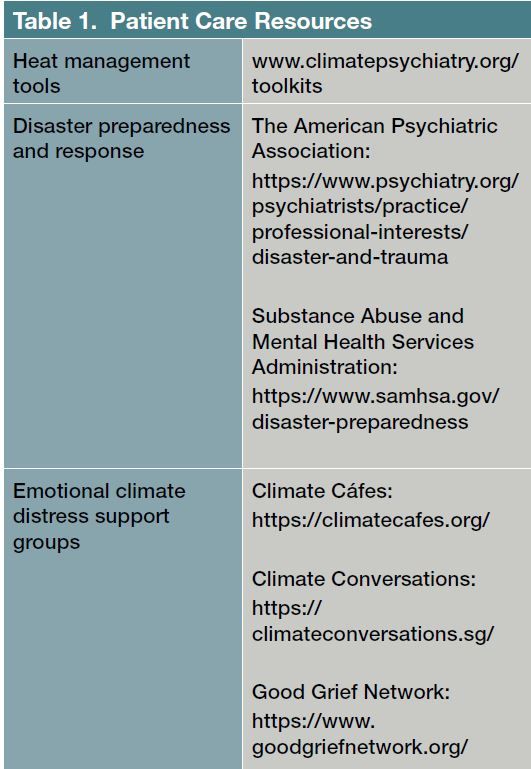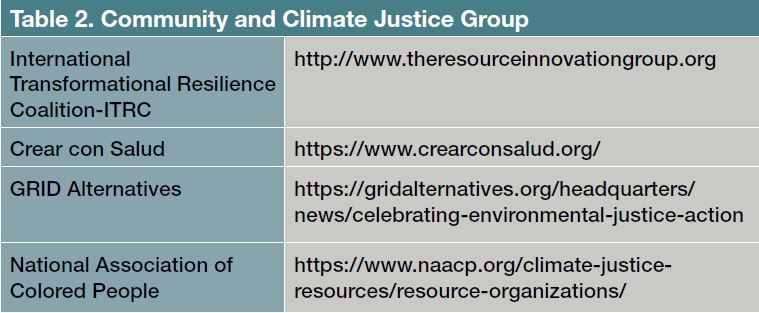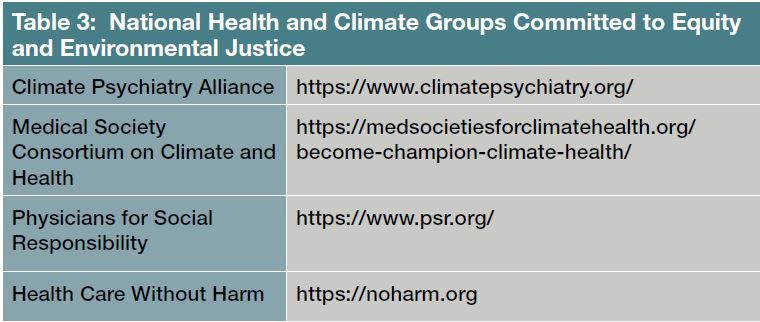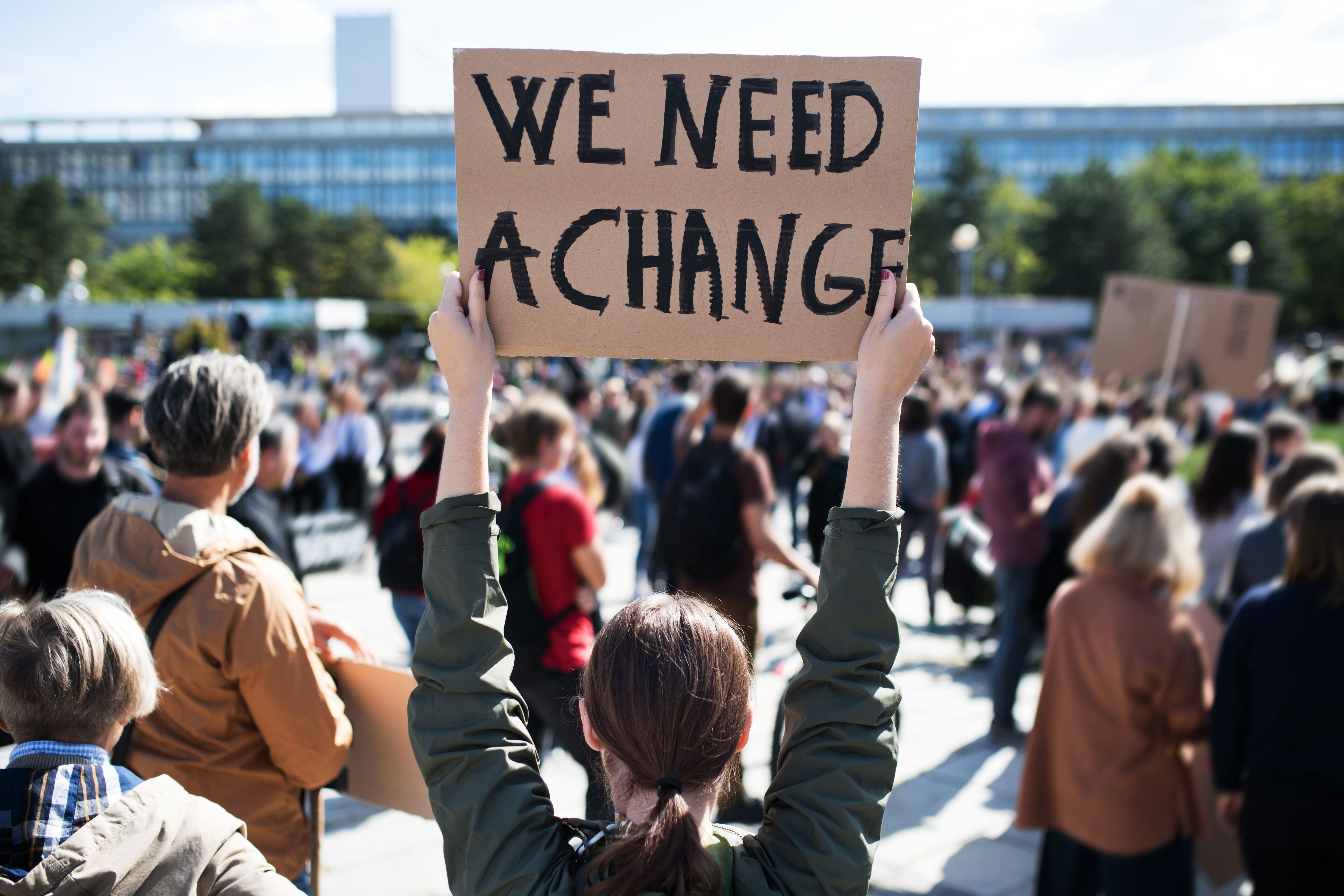Article
Next Steps: Solutions and Recommendations For Healing
Author(s):
Climate change is a devastating existential threat that can exaggerate preexisting inequities and health/mental health problems. As mental health professionals committed to understanding deep emotional wounds and addressing complexities of relationships, psychiatrists have the tools to assist in bridging the current gaps.
Radachynskyi/AdobeStock

COMMENTARY
Racism and Climate Change
We are psychiatrists who are deeply committed to addressing the devastating impacts of climate change on mental wellbeing and its differential impacts on vulnerable minority groups. Some of us came to this project steeped in knowledge and information but from a relatively privileged and comfortable place. The process of bringing together the voices of the various authors in this series, each contributing their rich and varied cultural experiences, has deepened and enriched the awareness of our interconnection.
These conversations have been challenging, but these are some of the difficult conversations we must have as a profession and as a society. Those of us who have been buffered from the devastating impacts of climate change and environmental degradation by our privilege, wealth, and class must recognize that this protection is ultimately an illusion. We are all bound by our shared vulnerability and must face our shared humanity.
We must address racism and climate change together. Hop Hopkins of the Sierra Club lays the connection bare: “It’s no exaggeration to say that racism and white supremacy harm all of us, because in addition to robbing us of our humanity, racism is also killing the planet we all share." He elaborates by saying, “we will never survive the climate crisis without ending white supremacy …You can’t have climate change without sacrifice zones, and you can’t have sacrifice zones without disposable people, and you can’t have disposable people without racism.”1
Lessons From the Margins
The articles in this series have highlighted both the tribulations and resiliency of communities of color. In particular, the Indigenous voices speak to the need for rematriation: the renunciation of the current patriarchal, fractured systems and a return to Indigenous wisdom that recognizes the unity between all living beings and the continuity between prior generations and future descendants. This embraces the essential awareness that we are all dependent on the earth as our only sustainable home.
The nonprofit organization Crear Con Salud in Puerto Rico has demonstrated resiliency, community empowerment, and local leadership as it overcomes passive reliance on a distant, unresponsive, neglectful government. Voices from Black communities remind us to confront the hard reality of climate change and its intersection with racism by exposing the daily experiences of communities tarnished by environmental pollutants. The Asian experience opens our eyes to experiences beyond our own borders, challenging our American-centric view. This section underscores both the profound impacts of the climate crisis on Asian countries as well as the huge contribution of emissions by Asian nations. We have much to learn from each other as we move forward.
These varied experiences illuminate our shared burdens. Like a woven tapestry, individual-colored threads bind together in a whole that is stronger than the separate fibers. The challenge is to both honor and acknowledge individual community experiences, and to simultaneously join together in a collective effort.
Building New Alliances
Climate change is a universal threat endangering the entire world. It is not a problem for any one group but a problem for us all. We must find common ground from our shared values, emphasizing equality, respect, and compassion for all, with a forceful commitment to collective climate action.
An essential step must be to address the current homogeneity of groups combating climate change. We cannot sustain the current situation of predominantly White-dominated climate change groups and BIPOC (Black, Indigenous, People of Color)-dominated environmental justice groups focusing primarily on local issues. Our efforts must establish collaborative ways of working together. As mental health professionals committed to understanding deep emotional wounds and addressing complexities of relationships, we have the tools to assist in bridging the current gaps.
As this series has illustrated, climate change is a devastating existential threat that can also exaggerate pre-existing inequities and health/mental health problems. Yet it also opens the possibility of repairing centuries of embedded structural racism. The solutions that emerge from our shared values must hold to the fundamental principle that climate justice is social justice, and social justice is health and mental health justice. This inevitably will include reparative justice: the possibility of repairing damages inflicted by unequal social, racial, economic structures, and climate disruption.
Signs of Hope
The Biden/Harris administration has committed itself to addressing both the legacy of our racist history and our reliance on extractive fossil fuel-based economy. One of President Joe Biden’s first actions was to sign an executive order returning the United States to the Paris Agreement. In choosing his appointments, Biden has mobilized stellar leaders who embrace equity, strive to correct massive wealth disparities, and implement climate solutions.
Policies that address climate chance will have either direct or downstream health and social benefits for us all. But particular policies and regulations that have important impacts on communities of color include restrictions on oil and gas drilling on public lands, infrastructure projects with creation of green jobs, emission and toxic exposure regulations, and housing policies including improvements in substandard housing, transportation, and health access. There are signs that the new administration will integrate climate and environmental justice into policy planning across all levels of government, from community and local to state and national.
The business community is also moving forward, with several large corporations setting goals for carbon neutrality. Since a large percentage of emissions are due to the transportation sector, the dramatic steps taken by the domestic and foreign auto industry—setting net-zero carbon emissions goals and shifting production to electric vehicles—is significant.2 Other businesses are following suit, with Apple leading the way by pledging carbon neutrality by 2030. Additionally, Apple sustainability leader, Lisa Jackson, MS, is spearheading climate justice initiatives by putting equity and climate justice at the forefront of programs directed to support Black and Brown entrepreneurs.3 Business leadership at this level can set the stage for others to follow.
Additionally, the growing attention to creating sustainable operations within the health delivery system is one of the ways of getting our own house in order.4
Recommendations
Mental health care professionals have important roles in creating solutions. The following recommendations are numerous and applicable across many domains. No one action, plan, or policy can address the enormity of the problems, but all in combination could decisively improve the future prospects of our communities.
While direct patient/individual recommendations are essential, climate change and the associated racial inequities are not individual issues. They must be addressed at broader systemic and community levels.
Individual patient/provider. It is important for us to examine and process our own feelings and confront our implicit biases about race, cultural differences, and climate. This is not a fleeting look but requires consistent self-reflection.
Table 1. Patient Care Resources

To care for diverse patients, we must incorporate culturally and linguistically appropriate material for patients with specific emphasis on climate-related mental health threats. Clinicians should integrate assessment of risk into discussions with our patients before predictable climatic events. The newly created Climate Aware Therapist project is one attempt to expand the network of therapists and empower them to address climate related emotional issues (Table 1).
We must develop ways to assist the growing group of individuals struggling with climate-related emotional difficulties and eco-distress experiences. We can offer our shared knowledge and emotional support skills and strategies. These include emotional regulation tools, group emotional supports, and integration of nature-based engagement activities into clinical suggestions for calming and sensory-affective modulation. This is particularly important for children, both for emotional regulation and to instill a sense of stewardship of the natural world.
Community/systems of care/public health model. Our mental health system does not have the capacity to meet the increasing needs posed by climate change. We need to rethink our systems of care, expand, upon the current one-to-one treatment approach, and develop new models that focus on building the skills, resources, and social connections that are essential to prevent extensive psychological, emotional, and behavioral problems associated with climate disruption. This paradigm shift is founded on the awareness that emotional and psychic responses are not solely an individual issue, but are derived from real economic-political problems that call for social change.
There are many ways to lend emotional support to those who experience the inequities and racial disparities of the climate crisis. The Groundswell Climate Collective (GCC) is one such creative project that can be a model for other programs.5 The GCC is committed to sharing the voices of people of color and developing community resilience. They utilize visual arts, writing, poetry, and other creative projects in efforts to prioritize youth engagement.
Additionally, we must develop collaborative relationships with other health providers, especially primary care, pediatrics, and obstetrics/gynecology. Psychiatrists can also serve as consultants and resources for paraprofessional and community leaders.
Table 2. Community and Climate Justice Groups

Fostering resilient communities is essential. Resilient communities are networks of local groups that develop emotional support and enhance community empowerment. Community Resilience relies upon strong social networks and attachments, a spirit of cooperation and altruism, trusted community leadership, and strong partnerships among schools, community organizations, faith groups, and health institutions. Providing adequate resources is essential, especially for underserved communities, and may require advocacy for funding sources (Table 2).
Public health advocacy and policy: a call to action. There is no time to waste. Increased global temperatures have risen annually since mid-20th Century, and the polar ice caps are melting at an alarming rate.6 Since the impacts of climate change on mental health are substantially influenced by social factors, influencing outcomes requires engagement in public policies. We must advocate for better governmental regulations, new laws, and funding of governmental and institutional activities as well as collaborative international agreements and treaties aimed at stopping climate change and eradicating racism.
Our professional organizations must be our voice in advocacy. Professional organizations can provide the tools and training to develop advocacy skills, and their political action committees can advocate for climate-friendly policies directly. Taking an important step, the American Psychiatric Association (APA) has recently allocated resources and attention to the climate crisis, establishing the Committee on Climate Change and Mental Health. However, there is more work to do. We must connect our organizations in order to strengthen our movement and increase its effectiveness.
Table 3. National Health and Climate Groups Committed to Equity and Environmental Justice

There are many national health organizations that focus on climate change and health with an equally strong commitment to addressing environmental justice, equity, and the impacts on vulnerable populations (Table 3).
Concluding Thoughts
We began this series with the Persian poet Saadi’s words, which is inscribed on the United Nations Building. They remind us of our duties to each other we mobilize to address structural racism and climate change.
The sons of Adam are limbs of each other,
Having been created of one essence.
When the calamity of time affects one limb
The other limbs cannot remain at rest.
If thou hast no sympathy for the troubles of others
Thou art unworthy to be called by the name of a human.
Climate change and structural racism threaten us all. We must recognize our interdependence and interconnection with the entire world population and join collectively to face this existential threat. It is through effective collective actions that we can create a more fair, equitable, and sustainable future for ourselves, our children, and our grandchildren.
Dr Cooper is clinical associate professor in the Department of Psychiatry at the University of California, San Francisco. Dr Hwang is in the psychiatry and behavioral sciences in the Vanderbilt University Medical Center. Dr Lim is Clinical professor of psychiatry and behavioral sciences at the University of California, Davis, and received the Kung Po Soo Award from the APA in 2015 for contributions to understanding Asian American patients with mental health issues. Dr Colon-Rivera is the Asociación Puertorriqueños en Marcha Medical Director, a University of Pittsburgh Medical Center attending physician, and President of the APA Hispanic Caucus. Dr Maginley is a practicing psychiatrist at Garnet Health in New York. Dr Miranda is a child and adolescent psychiatry fellow at Northwell Health. Dr Plata is a psychiatry resident at Garnet Health Medical Center in Middletown, New York. Dr Roessel is the first woman Navajo psychiatrist to provide Indian Health Service clinical care in New Mexico and a Distinguished Fellow of the American Psychiatric Association. Dr Vieux is Chairman of the Department of Psychiatry at Garnet Health Medical Center and is on the editorial board for Academic Psychiatry.
To see more on race and climate change, see The Tangled Roots of Racism and Climate Change.
References
1. Hopkins H. Racism is killing the planet. Sierra Magazine. June 8, 2020. Accessed May 7, 2020.
2. Barra M. General motors intends to lead the auto industry and the world to a net-zero-carbon future. LinkedIn. January 28, 2021. Accessed May 7, 2021.
3. Jackson L. Protecting our planet: Lisa Jackson. Washington Post Live. April 22, 2021. Accessed May 7, 2021.
4. HCWH: Health Care Without Harm. Accessed May 7, 2021.
5. GCC: Groundswell Climate Collective. Accessed May 7, 2021.
6. Lindsey R, Dahlman LA. Climate change: global temperature. Climate.gov. March 15, 2021. Accessed May 7, 2021.
Newsletter
Receive trusted psychiatric news, expert analysis, and clinical insights — subscribe today to support your practice and your patients.





